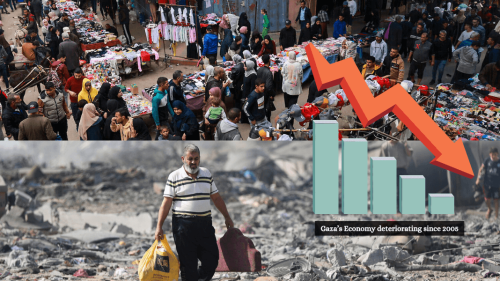Debt Relief and the G8
In a live web-cast from Zambia, several impoverished African villagers voiced their frustrations Thursday over living conditions to U.K. Chancellor Gordon Brown. The program, broadcast by the evangelical Christian relief group Tearfund, centered on the effect of the crippling debt many developing countries face and came on the eve of a high level G-8 meeting in Cologne, Germany. The meeting is set to tackle various proposals for the alleviation of the debt crisis faced by some 52 heavily indebted nations.
The impoverished countries, most of them in Africa, face appalling living standards that many analysts believe are worsened by high debt payments. Zambia has a $7.1 billion foreign debt and 70 percent of its people live below the poverty line. It is estimated that each person in developing countries owes $573 to Western nations, lender institutions such as the IMF and the World Bank and private individuals. For most countries, the debt payments exceed expenditures for essential services such as health, sanitation and education. Payment on Tanzania's $7.9 billion debt equals 152 percent of its annual GNP, according to the BBC. The 1997 report of the United Nations Development Program (UNDP) notes that the unpayable foreign debts are a "millstone around the necks of the poorest countries" and that their cancellation could "save the lives of millions of children by 2000."
In an article published by Jubilee 2000, a broad coalition working for debt cancellation by the year 2000, Joseph Hanlon writes, "we must assume it to be a violation of human rights that children in Africa do not go to school so that debts can be repaid." The Archbishop of Canterbury, Dr George Carey, said at a recent rally for Christian Aid, "There are many millions of people dying of economic bondage because of unpayable debt."
U.K. Chancellor Gordon Brown is expected to propose the most comprehensive debt relief package at the meeting in Cologne. According to reports from the BBC and Jubilee 2000, analysts expect him to propose a $50 billion relief package. In a recent BBC interview, Brown cited the fact that the world's poor "have been saddled, and, indeed, crippled by unpayable levels of debts that are unsustainable." While Brown admitted that the $50 billion is "not the summit of our ambitions" -- especially in light of debt relief campaigners who have called for a relief package of as much as $300 billion -- the British Chancellor said he is confident that the figure is "a very substantial amount of money."
But advocates of full debt cancellation say that even Brown's best possible case scenario is insufficient. Jubilee 2000 estimates that the package would provide a mere $2.83 for each person per year in the world's 52 poorest countries, or enough to buy an extra five loaves of bread or one bag of rice during the year. In a recent press release, Jubilee 2000 coalition leader Ann Pettifor called the $50 billion figure a joke and said, "Despite flowery speeches and grand gestures, G8 leaders are offering only crumbs of comfort to the world's most indebted nations."
Speaking to iviews.com Thursday, world economic specialist Jeffrey Frankel of the Brookings Institute said that the need for world debt relief was real and he lauded Brown's proposal as "a substantial increase over previous proposals." Frankel dismissed criticism of the amount by saying, "Obviously it's not as much as Jubilee 2000 and borrower countries would like, but that's always going to be the case."
Other analysts are skeptical of any form of debt reduction. In a report published by the BBC, Karl Ziegler, director of the Center for Accountability and Debt Relief (CADRE), writes that the poor will not be benefited by debt relief and that the extra money will inevitably end up in the hands of the corrupt ruling elite.
The IMF, which has received much criticism for its uncompromising loans and austerity measures, defends its right to handle developing countries as it does. According to Council on Foreign Relations (CFR) expert Chikondi Mseka, writing in the LA Times, the IMF and the World Bank fear the loan breaks would undermine the system of borrowing and lending upon which investment depends. In a June 4 speech to the CFR, IMF Managing Director Michel Camdessus defended the IMF's refusal to cancel loans, saying that Western governments should take more responsibility in supplying aid donations; donations that have fallen to their "lowest level relative to GDP in a generation." Camdessus conceded that debt relief "will certainly contribute to the alleviation of poverty" but insisted that "the best antidote to poverty is sustainable high-quality growth."
But there are some key elements missing from any defense of continued indebtedness of developing countries. Foreign creditors shrug off the idea of the cancellation of loans by saying that economic development is the primary stimulus for the alleviation of poverty. But the debt burden is often the cause of economic stagnation. A group of religious leaders echoed this sentiment in February in a statement which said that "substantial debt relief could end the downward spiral of economic degradation in developing countries," as quoted by the BBC. Jubilee 2000's Hanlon says that if world lenders were serious about the economic prosperity of borrower nations, they would insert the all-important "bisque clause" as was applied in 1953 loans granted to Germany. This clause stated that Germany could halt payment on its loans when the country reported an inadequate trade surplus. Only three of the 93 poorest countries in the world today have a trade surplus.
The immediacy of the problem and the questionable link between development and poverty alleviation are further weak spots in the argument that economic development is the best answer to the severe humanitarian crisis facing the developing world. The cancellation of the debt frees up immediate funds that can be used for badly needed necessities. Economic development is at best, based on a trickle down, gradual benefit for the poor. Moreover, there is skepticism that economic development, while it does not specifically hurt the poor, does not help them either. C. Peter Timmer of Harvard's Consulting Assistance on Economic Reform (CAER) project remarks in an article entitled Briefing Note 6 that appeared on CAER's website, that "the apparent failure of economic growth to reach the poor in precisely those environments where the connection would seem to be most crucial is clearly disappointing." Timmer observes that economic development only benefits the rich in countries where there is not already a somewhat equal distribution of wealth.
As for fears of corruption, immediate debt forgiveness would easily be a more effective manner to encourage greater government transparency than IMF and World Bank austerity measures. Indeed, there is no proposal for debt relief, even that of Jubilee 2000, which does not include a rigorous program for monitoring government corruption.
Donors clearly have the ability to cancel the debts of developing countries without serious strain on themselves. In a June 11 statement published by the Harvard Institute for International Development (HIID), Jeffrey Sachs says that lending institutions and countries already undervalue the loans to poor countries to such an extent -- sometimes at only 10 percent of the face value -- that their cancellation would cause little effect. In reference to loan forgiveness, Jeffrey Frankel says, "there is no question the rich countries can afford it, it's a question of whether or not they are willing."
As prominent world leaders assemble Friday in Cologne, it is not their ability to meet the needs of the world's poor that will be tested. The upcoming G-8 meeting will reveal the willingness of the world's rich to help the poor. While the $50 billion package is perhaps inadequate, even Gordon Brown, as quoted by the BBC, intends to remind the G-8 leaders that "the wealth of the richest countries is a responsibility and the needs of the poorest countries and meeting them are an obligation the rich countries must discharge."
Zakariya Wright is a staff writer at iviews.com

















